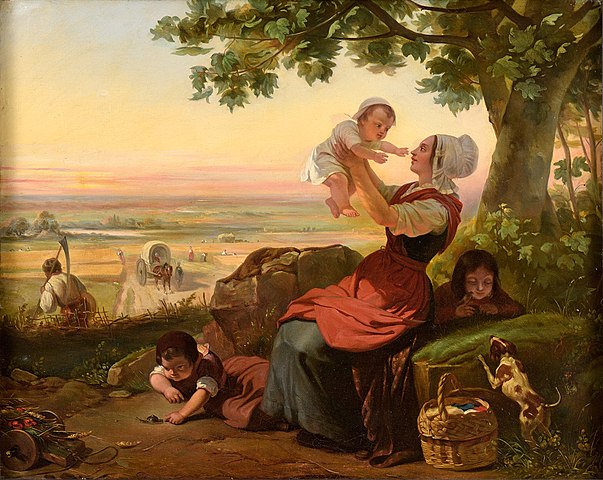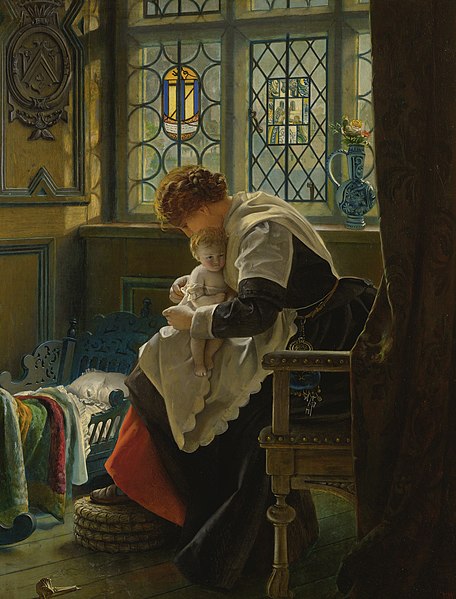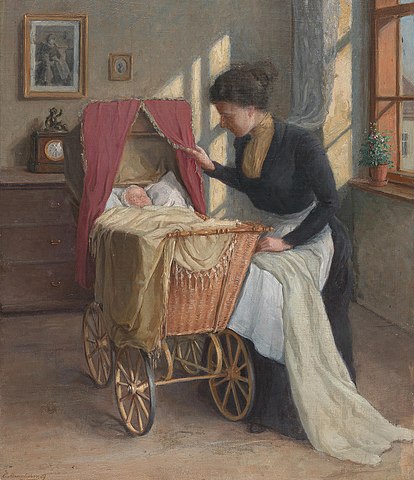
The Thammasat University Library has acquired a new book that should be useful for students interested in biology, medicine, sociology, history, design, gender studies, and related subjects.
Designing Motherhood: Things that Make and Break Our Births is by Michelle Millar Fisher and Amber Winick.
The TU Library collection includes several books about different aspects of motherhood.
Michelle Millar Fisher is an architecture and design historian who is Curator of Contemporary Decorative Arts at the Museum of Fine Arts, Boston, Massachusetts, the United States of America.
Amber Winick is a writer and design historian.
Their book examines designs of objects that have affected different aspects of birth and maternity over the past hundred years. It is divided into four sections: reproduction, pregnancy, birth, and postpartum.
These include historical examples of such items of material culture as pregnancy tests, obstetrical forceps, strollers, and others. Designing Motherhood attempts to examine cultural histories of birth and see how bodies influence design and the contrary.
As the book explains, “The material culture of human reproduction speaks volumes about its perceived value. Designing Motherhood unpacks the history of science, design, and culture to deepen an understanding of ourselves as people and a society, and looks for ways where design can address some of humanity’s most pressing issues.”
Although some history and design museums own such material, they are usually not on display, possibly because they are not considered artistic enough to be interesting for visitors.
The Metropolitan Museum of Art Costume Institute in New York, USA, owns historic maternity-wear pieces, including a late-1800s silk burgundy gown, but they are not on public view, either.
So it is of special interest to look at these rare objects in terms of design history, as the authors note: “Museum collections, fashion and design exhibitions, the mainstream of design scholarship, and many public forums have yet to fully embrace maternity as a topic worthy of serious inquiry.”
Material discussed starts with objects found in the ancient Roman ruins of Pompeii up to the present day.
Some of the study material was found from online vendors such as Etsy and eBay, including a vintage baby stroller.

Here are some thoughts about motherhood by authors, most of whom are represented in the TU Library collection:
The real religion of the world comes from women much more than from men — from mothers most of all, who carry the key of our souls in their bosoms.
- Oliver Wendell Holmes, Sr., in “The Professor at the Breakfast Table” in The Atlantic Monthly (May 1859)
Whatever else is unsure in this stinking dunghill of a world a mother’s love is not.
- James Joyce, A Portrait of the Artist as a Young Man (1916)
My mother is like the bright light in the sky, a doe on the hillsides. She is the morning star, shining even at noon-time.
- Lu-diĝira, The message of Lu-dingira to his mother (mid to late 3rd millennium BCE)
She was not, herself, hugely in favor of motherhood in general. Obviously it was necessary, but it wasn’t exactly difficult. Even cats managed it. But women acted as if they’d been given a medal that entitled them to boss people around. It was as if, just because they’d got the label which said “mother,” everyone else got a tiny part of the label that said “child”…
- Terry Pratchett, Carpe Jugulum (1998)
In the hands of woman lies the salvation of humanity and of our planet… The mother suggests the first conscious thoughts to her child. She gives direction and quality to all his aspirations and abilities. But the mother who possesses no thought of culture can suggest only the lower expressions of human nature. But in her striving toward education, woman must remember that all educational systems are only the means for the development of a higher knowledge and culture. The true culture of thought is developed by the culture of spirit and heart. Only such a combination gives that great synthesis without which it is impossible to realize the real grandeur, diversity, and complexity of human life in its cosmic evolution. Therefore, while striving to knowledge, may woman remember the Source of Light and the Leaders of Spirit—those great Minds who, verily, created the consciousness of humanity. In approaching this Source, this leading Principle of Synthesis, humanity will find the way to real evolution.
- Helena Roerich in Letters I, (1 March 1929)
You should not speak arrogantly to your mother; that causes hatred for you. You should not question the words of your mother and your personal god. The mother, like Utu, gives birth to the man.
- Šuruppak, Instructions of Shuruppak (3rd millennium BCE)
The bearing and the training of a child
Is woman’s wisdom.
- Alfred Tennyson, The Princess (1847)
I’ve always been interested in the Mother Goddess. Not long ago, a young person, whom I don’t know very well, sent a message to a mutual friend that said: “I’m an addict of Mary Poppins, and I want you to ask P. L. Travers if Mary Poppins is not really the Mother Goddess.” So, I sent back a message: “Well, I’ve only recently come to see that. She is either the Mother Goddess or one of her creatures — that is, if we’re going to look for mythological or fairy-tale origins of Mary Poppins.”
- P. L. Travers, in The Paris Review No. 86 (Winter 1982)
All women become like their mothers. That is their tragedy. No man does. That is his.
- Oscar Wilde, The Importance of Being Earnest, Act I.
A mother is the truest friend we have, when trials heavy and sudden fall upon us; when adversity takes the place of prosperity; when friends desert us; when trouble thickens around us, still will she cling to us, and endeavor by her kind precepts and counsels to dissipate the clouds of darkness, and cause peace to return to our hearts.
- Washington Irving
My mother was the most beautiful woman I ever saw. All I am I owe to my mother. I attribute my success in life to the moral, intellectual and physical education I received from her.
- George Washington
Being a mother is an attitude, not a biological relation.
- Robert A. Heinlein, Have Space Suit—Will Travel
God know that a mother need fortitude and courage and tolerance and flexibility and patience and firmness and nearly every other brave aspect of the human soul.
- Phyllis McGinley

(All images courtesy of Wikimedia Commons)
